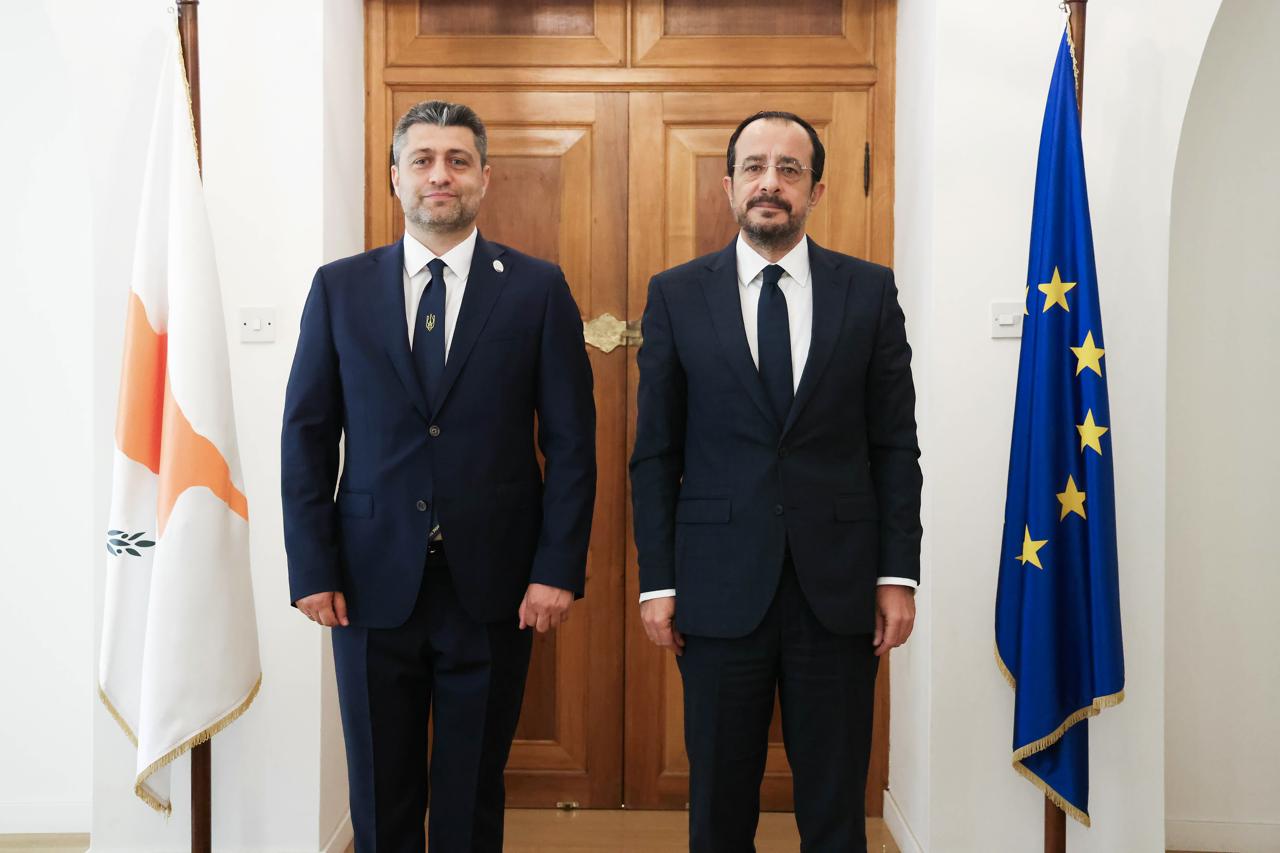By Dr Sergii Nizhynskyi
Since my appointment in July 2025, I’ve been guided by what I call the Ten Commandments of Strategic Partnership, which I presented to President Nikos Christodoulides on September 12, 2025, during the credentials ceremony.
These principles focus on deepening political dialogue, boosting economic ties, advancing technological innovation, providing humanitarian support and supporting Ukraine’s EU integration. With Cyprus’ upcoming EU Presidency in 2026, these principles align our goals to foster a secure and prosperous Europe.
Political dialogue is a cornerstone of our strategy. We want to institutionalie high-level visits and joint consultations on regional security, particularly within frameworks like the UN and EU Council. We’re also exploring a bilateral security agreement to strengthen our resilience against hybrid threats and cybersecurity challenges, especially in the Eastern Mediterranean and Black Sea regions.
Cybersecurity is a growing global concern. Ukraine has a robust IT ecosystem with over 200,000 specialists and a €7 billion industry, while Cyprus is a Mediterranean tech hub. We’re proposing joint startup incubators, exchange programmes for IT professionals, and collaborative projects under the EU’s Digital Europe Programme.
By combining Ukraine’s software development and blockchain expertise with Cyprus’s strengths in fintech, we can develop solutions to counter hybrid threats and drive digital transformation across Europe.
It does not need to be said that Ukraine’s socio-economic landscape is profoundly strained due to Russia’s unrelenting aggression, which systematically targets civilian infrastructure. Since the full-scale invasion began in February 2022, over 60 per cent of Ukraine’s energy infrastructure has been either destroyed or occupied, equating to a loss of approximately 12 GW of generating capacity by mid-2025, with an additional 10 GW damaged in 2024 alone, according to the Ukrainian Ministry of Energy.
This devastation has led to rolling blackouts, with households and industries facing power outages of up to 12 hours daily in some regions. Over 68,000 energy facilities, including power plants, substations and transmission lines have been damaged or destroyed, costing an estimated $16 billion in direct losses to the energy sector alone, as reported by the Kyiv School of Economics.
The human toll is staggering. As of September 2025, the United Nations estimates over 16,500 civilian deaths and 36,000 injuries, with 1.5 million people displaced internally and 6.7 million refugees abroad. The destruction of 256,000 infrastructure facilities, including schools, hospitals, and residential buildings, has crippled urban centres and rural communities alike.
Additionally, over 300 cases of conflict-related sexual violence (CRSV) by Russian forces are documented, with 220 cases against women, 70 against men and 16 against children, primarily in Kherson (80+), Donetsk (60) and Kharkiv (46) oblasts.
Despite these challenges, Ukrainian resilience shines through. Ukrainians continue to adapt, with communities rebuilding schools and homes despite being under constant threat, showcasing an indomitable spirit.
TheUkrainian businesses have demonstrated extraordinary adaptability, driving growth in key sectors despite the devastation caused by war. The IT sector, which contributes 5 per cent to GDP and generated €7.8 billion in export revenue in 2024, according to the IT Ukraine Association, remains a powerhouse, with companies like SoftServe expanding remote operations globally.
Agriculture, a cornerstone of the economy, has seen exports rebound to 80 per cent of pre-war levels, with 60 million tonnes to of grain shipped in 2024 via Black Sea corridors, according to the Ministry of Agrarian Policy.
Small and medium-sized enterprises (SMEs), which account for 60 per cent of jobs and 40 per cent of GDP, have pivoted to new markets, leveraging digital platforms and EU trade agreements to offset losses from occupied territories (20 per cent of Ukraine’s land). This resilience is boosted by international partnerships
Economic ties with Cyprus are another key pillar. Our trade is already showing promise – reaching € 117,67 million from January to June 2025, up from €105 million in 2024, despite global challenges. Ukraine exports grains, oils, and metals, while Cyprus provides services in finance and shipping.
Our goal is to double this trade by diversifying exports and reducing barriers through updated agreements. Cyprus was Ukraine’s second-largest investor in 2021, with €19 billion in direct investments and we’re encouraging more Cypriot capital for Ukraine’s reconstruction, especially in infrastructure and green energy. We’re also encouraging Ukrainian businesses to relocate to Cyprus, leveraging its tax incentives.
There is also the Agro Hub, which is is a flagship project that aims to make Cyprus a gateway for Ukrainian agricultural exports to the Mediterranean and beyond. It will focus on storing, processing, and distributing grains, oils and other products, capitalising on Cyprus’ strategic location and port infrastructure.
We’re in positive discussions with Cypriot stakeholders and plan to establish logistics warehouses backed by war-risk insurance. This hub will enhance food security, create jobs and integrate Ukrainian agribusiness into global supply chains, supporting our post-war recovery.
My vision is a dynamic partnership that not only withstands current challenges but thrives. By deepening political dialogue, boosting trade, advancing IT cooperation,and launching projects like the Agro Hub, we can build a resilient alliance between Cyprus and Ukraine.
With Cyprus’ support for our EU path and joint humanitarian and cultural initiatives, we’re contributing to a more secure and prosperous Europe. I invite Cypriot leaders, businesses and citizens to join us in this journey.
Let’s build this partnership together. Slava Ukraini! Glory to Cyprus!
Dr Sergii Nizhynskyi is Ambassador Extraordinary and Plenipotentiary of Ukraine to Republic of Cyprus






Click here to change your cookie preferences